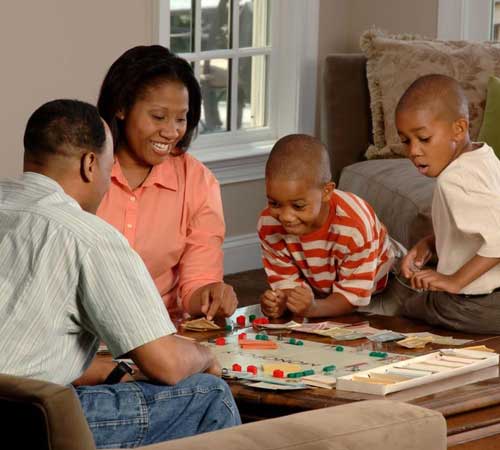Your values are your family’s moral and ethical principles. They are often a guide for the decisions you make and how you choose to structure your family.
It can be a bit more complex to try to define your family values, since there are more people to consider.
Here are 7 ways you can create/define your family values.
1. Reflect On Your Priorities
First, deconstruct your family and personal values.
Values are as important as they are personal, but few people actually choose their own values. Instead, most folks follow the values that were learned in childhood.
To deconstruct your values, think about your childhood and determine what values you absorbed and need to reconsider and probably shake off now.
Think specific. For instance, did your parents value religion, education, or wealth? How much did this impact your formative years?
You could consider asking your parents to discuss their values with you.
Ask them what they considered to be the family values, and why/how they integrated them into your development.
2. Reflect On Major Life Choices
Once you have thought about your earlier values, take some time to determine whether you have retained the same ideas throughout your life.
Reflect on the major decisions you have made in your life and determine if your family life reflect the values you originally had or you’ve evolved as you’ve gotten older.
Questions as these can help you define your values.
Also reflect on your career choice patterns.
For example, if fighting for social justice is a core value of yours, have you chosen a career path, such as social work, that integrates that value or it’s just about the money?
Another way to figure out what your values are is to examine how you spend your money. Does most of it go towards education? entertainment?
Nature? Or do you give a lot to NGOs or political causes?
3. Consider Common Values
You need to make a list of all of the values that you consider important to you. It is a great way for all members of your family to think about values.
Ask every family member who can write to make a list.
Your family can then rank the values on each list to help you define which are the most important to all of you.
Common values include: honesty, balance, generosity, wellness, humour, learning, leadership, and compassion.
Think about your family as you consider values such as humility, cooperation, financial stability, humility, and patience.
Try thinking about the values in terms of categories.
For example, your categories could include: Personality, Career, Family, Friends, Health.
Try looking at the list of values and figuring out which category to class them in.
This classification can lead to clarity about what matters most to you.
4. Ask Questions
Once you have spent some time thinking about your personal values, get on to figuring out how to integrate them with the rest of your family. In order to achieve that, you all need to effectively communicate with each other. Begin the process by asking your family to join you for a discussion about values. Begin by asking open-ended questions like “What is most important to our family?”
You can also try things like:
- What brings you happiness; how does that impact our family?
- What makes you most proud about our family?
- Are there things you look forward to when you come home?
- What embarrasses you about our family?
- What does our family provide for you that you don’t get from friends?
Consider getting each family member answer these questions individually. Then you can openly and honestly compare answers.
Encourage them to ask questions, too. And as much as you can, be a good listener. During this family discussion, it is important that you all practice good listening skills.
To indicate that you are listening, take notes and ask follow up questions.
For example, if your spouse says he values honesty, ask him how that can become more of a focus for the family.
You can also use non-verbal cues (gestures) to indicate that you are listening.
Try to limit interruptions; nod your head when someone is speaking, and smile to indicate you appreciate what is being said.
Remind everyone to put away their cell phones, and turn off the tv while you are having this important conversation.
5. Solidify Tour Family Values
After you have spent some time discussing your family values and enjoying quality time together, you can begin the process of more clearly defining your family values.
Take time to sit down together and make a list of the values that are most important to the peace and progress of the family.
You can think of these values as firm guidelines that your family is agreeing to co-exist by.
Try having each family member pick 3-4 values that they feel are most important. Put together, this will give you a manageable number of values to put on your permanent list.
For example, you could choose “safety” as one of the primary values for your family.
Each family member could then say something on how they will stick to this value.
You and your partner could pledge to always drive the speed limit. Your adolescent could promise to always wear a helmet when riding her bike.
Also, writing things down can help your family gain clarity about shared values.
6. Make Sure Your Children Are Involved
Handle defining your family values as a family decision.
If your children are a little older, such as teenagers, or even adolescents, make sure they feel like they are an important part of the process.
Say things such as, “We want to hear your opinion. How do you feel about including education as one of our core family values?”.
Have You Read: Family Planning: How To Prevent Pregnancy
You can also encourage your kids to expatiate their opinions.
Try saying, “What inspired this choice? Why do you think adding humour as a family value is the best option?”
If your children are still young, you can find other ways to get them involved. You could try having them draw a picture of the things they love about your family.
7. Model Your Values
The best way to integrate your family values into your daily life is to see to it that your actions reflect those values.
Ensure that the choices you make are in line with what you consider to be your most important family values.
It’s okay if it’s sometimes difficult to uphold the values you hold. In all truth, doing so is a process, and spiraling into negative emotions about your struggles won’t make things easier.
If your number one family value is honesty, ensure that you are candid and truthful.
Apply this value to your work life and your social life because modeling is the best way to help children learn values.
For instance, if you value respect, show your kids how to be respectful by always addressing other people with consideration.
Find more resources on family life here..



![It is important to re-set their sleep pattern to get enough rest needed to bring them up [Photo Credit Instagram @theokechikwutriplets]](https://fabmumng.com/wp-content/uploads/2021/03/How-To-Sleep-Train-Twins.jpg)
